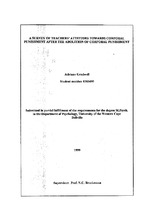| dc.contributor.advisor | Broekman, Neil | |
| dc.contributor.author | Gradwell, Adriaan | |
| dc.contributor.other | Dept. of Psychology | |
| dc.contributor.other | Faculty of Community and Health Sciences | |
| dc.date.accessioned | 2013-06-20T12:12:42Z | |
| dc.date.available | 2007/03/28 10:04 | |
| dc.date.available | 2007/03/28 | |
| dc.date.available | 2013-06-20T12:12:42Z | |
| dc.date.issued | 1999 | |
| dc.identifier.uri | http://hdl.handle.net/11394/1520 | |
| dc.description | Magister Psychologiae - MPsych | en_US |
| dc.description.abstract | Education within South Africa has undergone significant change within a short period of time. This change has primarily been written in terms of human rights and the equitable distribution of educational resources. This has necessitated a paradigm shift for many teachers and the study explores some of the factors that have prevented teachers from experiencing a paradigm shift. The introduction of the South African Schools Act of 1996 heralded the start of the complete abolition of corporal punishment within all South African schools. The object of this investigation was to explore teachers' attitudes towards the abolition of corporal punishment and the factors that would contribute towards their attitude. The research explored whether the attitude of teachers, in relation to corporal punishment, had been influenced by the disruptive behaviour of pupils and their perceptions of the efficacy of alternate methods of behaviour management. | en_US |
| dc.language.iso | en | en_US |
| dc.publisher | University of the Western Cape | en_US |
| dc.subject | Corporal punishment | en_US |
| dc.subject | South Africa | en_US |
| dc.subject | School discipline | en_US |
| dc.subject | Law and legislation | en_US |
| dc.title | A survey of teachers' attitudes towards corporal punishment after the abolition of corporal punishment | en_US |
| dc.type | Thesis | en_US |
| dc.rights.holder | University of the Western Cape | en_US |
| dc.description.country | South Africa | |

